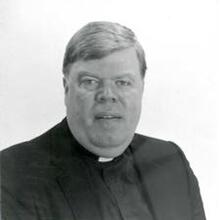November is the month of the Holy Souls. With dramatic flair, the church urges us to pray for the dead as nature undergoes its annual decline. The darkening skies, the crumpled leaves and the denuded boughs become the stage to face our own mortality in the light of faith.
Through the centuries the church has developed its own rich ars moriendi: the requiem Mass, the sacrament of the sick, the deathbed viaticum, the prayers for the dead, the wake service with its rosary, the prayers at the graveside, the annual memorial Masses and pious visits to the tomb.
Church doctrine undergirded the practices. The paschal mystery of Christ, especially the glory of the Resurrection, fortified the Christian facing the prospect of the particular and final judgments, of heaven, purgatory and hell. Intercessory prayer reached a crescendo as the churches militant, suffering and triumphant joined in solidarity to aid the pilgrim soul in arriving at the beatific vision. Even philosophical arguments for the immortality of the rational soul, once a staple of Catholic education, deepened the sober hope of the dying and the bereaved as they confronted the enigma of death.
In recent decades our capacity to mourn and to pray for the dead has palpably declined. It has something to do with the longstanding American denial of death, skewered decades ago by Evelyn Waugh, and our new “selfie” culture, where every ritual descends into bloated autobiography. But the church must also face its own internal difficulties in helping its members to face death in a properly Christian manner.
The first step is simply to acknowledge that someone has actually died. As an adolescent, I was taught to say, “I am so sorry for your grief,” to the bereaved during a wake service. Several years ago, however, a new euphemism for death slipped into the American language: “X is in a better place.” It’s as if you arrived at the downtown Marriott and instead of being given the budget-economy room you paid for, you were given the honeymoon suite gratis. The old Christian Scientist euphemism “X passed away” has morphed into “X passed,” as if death were the LSATS and God an easy grader.
With the disappearance of the wake and the rise of “life celebrations” (often featuring the deceased’s favorite hobbies), the church has an even greater imperative to proclaim the truth about death and the afterlife and to provide a space for the heartfelt mourning needed in the aftermath of a loved one’s death.
The second step is to look carefully at our celebration of funerals. Any pastor will admit that this is an emotional battlefield; one wants to console, not fight with a bereaved family. But the current distorted shape of our funeral Masses indicates our unease facing the mystery of death in the light of faith.
The rubrics for the Mass of Christian Burial clearly indicate that the sermon is not to be a eulogy of the deceased. The priest is to focus on Christian hope in the light of the Resurrection and prayer for the deceased as the deceased faces God’s judgment. But in many funeral Masses, the sermon—echoed by endless post-Communion “reflections”—has become nothing but a eulogy of the deceased’s virtues and achievements.
In some liturgies, a virtual canonization occurs. Occasionally accompanied by the strains of “Danny Boy” and Frank Sinatra’s “My Way,” the memorial service, a creation of Victorian agnostics, has overwhelmed the Christian prayer for the departed. At times it is unclear just why we have gathered to pray for and not only to remember the deceased.
Spiritual writers have long argued that the Christian should face death by shunning the extremes of presumption (“God is all-merciful; there’s no need to repent”) and despair (“God is all-just; a sinner, I cannot be saved”). The merciful God we face in the mystery of death is none other than the God who respects our freedom and the choices we have made. And we stand before God as members of the church interceding at our side in the long drama of our salvation.
This season of prayer for the holy souls is an invitation to seek again the grace of a good death, rooted in the truth of the Gospel, which simultaneously proclaims both divine judgment and divine mercy. It is the glory of the cross, not an embellished curriculum vitae, that guides us toward the mystery.








